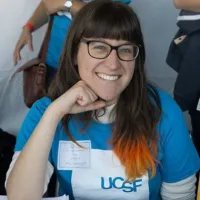A Fond Farewell
The path to a PhD is a treacherous one. It is paved with failure, stress, and uncertainty. I find myself tripping often, crawling along until I can finally stand up only to trip again.
One thing that has made this path less bumpy, however, is Synapse.
Synapse allowed me to still feel a sense of accomplishment and purpose even when things in lab were failing. It necessitated that I take some time away from my research, and by doing so I’ve actually enriched my research.
We live in a time when more than ever scientists must know how to communicate their work. Synapse has helped me gain this skill.
It started with my work as a copy editor first year. I edited many Research Spotlights and saw the writers’ different strategies for communicating complex scientific research.
Then I began writing, and even though I wasn’t always writing about science I found that practicing any kind of written communication helped develop my communication skills.
Synapse has sharpened my communication skills, allowing me to think differently about and better communicate my own research.
As I continued to write for Synapse I continued to flex my writing muscles. Now when I need to crank out an abstract or a paper, I can hit the ground running because I’m in the practice.
Additionally, the more I wrote the more I was exposed to great science, whether it be breakthrough discoveries from the scientific literature or active areas of research going on across the nation including in fields other than my own.
Furthermore, writing about these things compelled me to think more deeply about the science — to take a step back and not just focus on the results, but also consider the social impact and ethical implications.
In addition, to improving my writing and science communication, being editor-in-chief has also allowed me to hone my critical eye.
By learning the skills of an editor I’ve become better at evaluating not only writing but research. I can ask more critical questions and recognize where there are holes.
These are essential skills as a scientist and ones that will help me be a better peer reviewer of scientific research.
Serving as Synapse’s editor-in-chief has also helped pull me not only out of lab, but also out of the grad-school bubble.
I’ve gotten to talk to and collaborate with students outside my program. I’ve also had the chance to interact more with staff and faculty at UCSF.
I have even gotten the chance to talk one-on-one with professional science writers who cover some of the most important and I intriguing science topics of our time.
I am so grateful for all these experiences and feel it is time for another student to have the chance to learn and grow as I have.
It has been an honor and a pleasure to serve as the editor-in-chief of Synapse for the past three years. It is my sincerest hope that Synapse continues to share diverse stories, promote discussion and change, and spread truth.
Find out how you can take the helm as the next Editor-in-Chief here.



